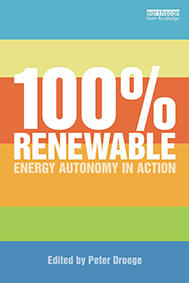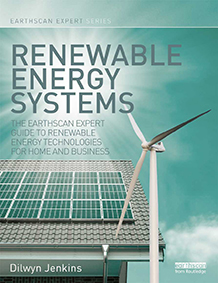100 Per Cent Renewable: Energy Autonomy in Action
Edited by Peter Droege, published 5 April 2012 by Routledge. Paperback: US$39.95/£24.99. ISBN: 978-1-84971-471-6
 100 Per Cent Renewable is full of information and ideas detailing the efforts of a number of pioneers in their attempts to reach a 100% sustainable energy supply. It has to be said, however, for the benefit of readers of this magazine, that this book does not have a chapter devoted specifically to wind energy. The book was edited and co-written by Peter Droege, and features 27 expert authors (including Hermann Scheer). The subjects of the chapters range from initiatives by individuals to visions for companies, communities and entire countries. The collection triumphantly presents ideas that overcome the old tired economic and technical counter-arguments, showing how the schemes featured not only can and do work, but do so economically and with technology already available.
100 Per Cent Renewable is full of information and ideas detailing the efforts of a number of pioneers in their attempts to reach a 100% sustainable energy supply. It has to be said, however, for the benefit of readers of this magazine, that this book does not have a chapter devoted specifically to wind energy. The book was edited and co-written by Peter Droege, and features 27 expert authors (including Hermann Scheer). The subjects of the chapters range from initiatives by individuals to visions for companies, communities and entire countries. The collection triumphantly presents ideas that overcome the old tired economic and technical counter-arguments, showing how the schemes featured not only can and do work, but do so economically and with technology already available.
The change to a sustainable world is inevitable – and the beginning steps pose the greatest challenge. A world so overwhelmingly dependent on fossil fuels requires bold ideas, dramatic shifts in thinking and action without delay. Fortunately, we can find examples of this change across the world and at all levels of personal and collective engagement. This book aims to portray a series of pioneering initiatives and their champions.
The book’s editor, Peter Droege, is professor and chair of Sustainable Spatial Development at the University of Liechtenstein, and conjoint professor in the Faculty of Engineering at the University of Newcastle, Australia. He is president of the European Association for Renewable Energy, Eurosolar, and General Chair of the World Council for Renewable Energy.
The book is related to the website www.100-percent.org. This website is designed to document, analyse and disseminate current practice, projects and plans for companies, individuals, communities, cities and countries determined to be entirely independent from fossil fuel and nuclear power.
Renewable Energy Systems: The Earthscan Expert Guide to Renewable Energy Technologies for Home and Business
By Dilwyn Jenkins, published 30 August 2012 by Routledge. Hardback: US$59.95/£34.99. ISBN: 978-1-84971-369-6
The aim of this book is ‘to guide the reader through the maze of renewable energy technologies as well as energy efficiency, enabling you to understand which technologies are appropriate for domestic and small to medium sized business applications’.
 The book begins with a section on environmental and economic factors and why people should generate their own energy. The author introduces the importance of energy efficiency in the second chapter. He starts by pointing out the importance of insulation and efficiency measures before using renewable energy technologies. The following chapters range through a variety of topics: solar thermal, heat pumps, photovoltaics, wind energy and hydropower. The last chapter offers case studies.
The book begins with a section on environmental and economic factors and why people should generate their own energy. The author introduces the importance of energy efficiency in the second chapter. He starts by pointing out the importance of insulation and efficiency measures before using renewable energy technologies. The following chapters range through a variety of topics: solar thermal, heat pumps, photovoltaics, wind energy and hydropower. The last chapter offers case studies.
The chapter on wind energy focuses on small turbines, with some mention of medium turbines. The chapter contains a good introduction to wind energy physics and small turbines, as well as providing information on connecting to the grid and feed-in tariffs.
The book has two annexes about financing small-scale renewable energy and a comprehensive and useful list of resources.
The book’s author, Dilwyn Jenkins, was Executive Director at the Powys Energy Agency between 2000 and 2004 and currently works from Wales as a consultant and writer on environmental issues, mainly related to energy, rainforest conservation, community development and cultural travel. Much of his work has focused on projects in Peru and Brazil as well as in Wales, Italy, Scandinavia and Austria. He is the author of Wood Pellet Heating Systems (Earthscan, 2010).
In summary, Renewable Energy Systems is an excellent and practical publication. If you are just starting in renewable energies, this is your guide. If you are already an expert in a specific renewable energy sector you ought to know about other renewable developments as well. Let this book be your timely source of information on the broader field of renewable energy. The book provides an expert overview of precisely which sustainable energy technologies are appropriate for widespread domestic and small business applications. It is an ideal book if you want to study the fundamental concepts, benefits, drawbacks, costs and paybacks of renewable energy technologies. With its numerous instructive illustrations, it’s a must have!
Reviewed by Frits Ogg, Renewable Energy Consultant, The Netherlands









